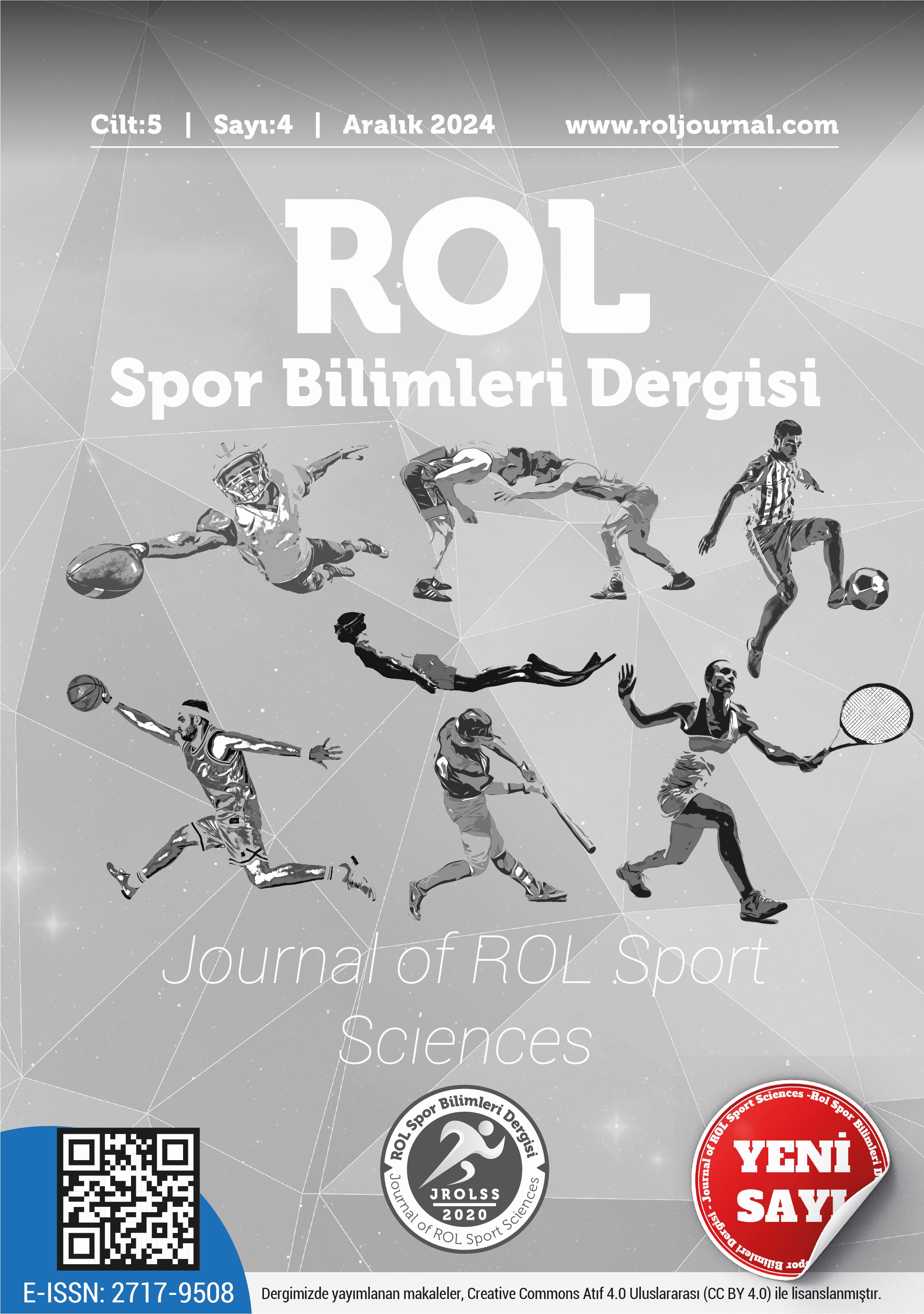The relationship between digital wellbeing and artificial intelligence literacy in faculty of sports sciences students: Application of structural equation model
DOI:
https://doi.org/10.70736/jrolss.463Keywords:
Digital Well-being, Artificial Intelligence, Student, LiterateAbstract
The development of technology has paved the way for the development of digital platforms. This development has brought the concept of artificial intelligence to the forefront. Based on these thoughts, the aim of the study is to examine the relationship between digital well-being and artificial intelligence literacy in students of the faculty of sports sciences. The relational screening model was used in the study. The research group consisted of 291 students determined by simple sampling method. The “Digital Well-being Scale” and “Artificial Intelligence Literacy Scale” were used in the study. In the analysis of the data, T-Test and ANOVA test were applied to evaluate the demographic characteristics. In addition, the research model created to examine the relationship between the scales was evaluated with the Structural Equation Model (SEM) test. Research findings and results; According to the T-Test results, there were no significant differences between gender, age and departments. According to the SEM analysis results, the path coefficient between digital well-being and artificial intelligence literacy was found to be statistically significant. Within the scope of this significance, it can be said that students' high artificial intelligence literacy levels positively affect their digital well-being.
References
Akgül, F. (2023). Üniversite öğrencilerinin dijital bağımlılık ve sosyal beceri düzeylerinin sportif etkinliklere katılım durumlarına göre incelenmesi. (İ, Bozkurt, Edt.), Gazi Kitabevi Tic. Ltd. Şti.
Arslan, A., Filiz, F., & Gül, H. (2023). Bireysel yenilikçiliğin dijital iyi oluşa etkisinin incelenmesi. Nevşehir Hacı Bektaş Veli Üniversitesi SBE Dergisi, 13(4), 2110-2134. DOI: https://doi.org/10.30783/nevsosbilen.1288085
Arslankara, V.B., Demir, A., Öztaş, Ö., & Usta, E., (2022). Digital well-being scale validity and reliability study. Journal of Teacher Education and Lifelong Learning, 4(2), 263-274. DOI: https://doi.org/10.51535/tell.1206193
Aytürk, Ö. (2021). Uygulama odaklı eğitim veren bölümlerde dijitalleşme ve yenilikçi yaklaşımlar. Ş. Karasar & Ü. İlgi E. A. (Ed.), Gelecek dündü; dijital bir üniversitenin bugünü. Maltepe Üniversitesi Yayınları.
Banaz, E., & Demirel, O. (2024). Türkçe öğretmen adaylarının yapay zekâ okuryazarlıklarının farklı değişkenlere göre incelenmesi. Buca Eğitim Fakültesi Dergisi, 60, 1516-1529. DOI: https://doi.org/10.53444/deubefd.1461048
Beattie, A., & Daubs, M. S. (2020). Framing ‘digital well-being’ as a social good. First Monday, 25(12) DOI: https://doi.org/10.5210/fm.v25i12.10430
Binns, A., Harreld, J.B., O'Reilly, C., & Tushman, M. (2015). The art of strategic renewal. MIT Sloan Management Review, Summer Edition, 1-3.
Burtgil, S.M. (2024). Eğitimde yapay zekâ kullanımına yönelik öğretmenlerin görüşleri. [Yüksek Lisans Tezi, Bahçeşehir Üniversitesi] Ulusal Tez Merkezi.
Büyüköztürk, Ş. (2015). Sosyal bilimler için veri analizi el kitabı. Ankara: Pegem Akademi Yayınları.
Cemiloglu, D., Almourad, M.B., McAlaney, J., & Ali, R. (2022). Combatting digital addiction: Current approaches and future directions. Technology in Society, 68, 1-11. DOI: https://doi.org/10.1016/j.techsoc.2021.101832
Çelebi, C., Yılmaz, F., Demir, U., & Karakuş, F. (2023). Artificial Intelligence Literacy: An Adaptation Study. Instructional Technology and Lifelong Learning, 4(2), 291-306.
Çetin, Ö., & Bilir Ataseven, F. (2020). Bilgisayar destekli çeviri araçlarında çevirmenler: Etnometodolojik çözümleme çalışması. Amasya Üniversitesi Sosyal Bilimler Dergisi, Çeviri bilim Özel Sayısı, 73-112.
Dwivedi, Y.K., Hughes, L., Ismagilova, E., Aarts, G., Coombs, C., Crick, T., ... et al. (2021). Artificial Intelligence (AI): Multidisciplinary perspectives on emerging challenges, opportunities, and agenda for research, practice and policy. International Journal of Information Management, 57, 101994. DOI: https://doi.org/10.1016/j.ijinfomgt.2019.08.002
Elçiçek, M. (2024). Öğrencilerin yapay zekâ okuryazarlığı üzerine bir inceleme. Bilgi ve İletişim Teknolojileri Dergisi, 6(1), 24-35. DOI: https://doi.org/10.53694/bited.1460106
Haenlein, M., & Kaplan, A. (2019). A brief history of artificial intelligence: On the past, present, and future of artificial intelligence. California Management Review, 61(4), 5-14. DOI: https://doi.org/10.1177/0008125619864925
Kara, D.N. (2019). Üniversite öğrencilerinin dijital iyi oluş hallerinin değerlendirilmesi [Doktora Tezi, Yakın Doğu Üniversitesi].
Kebapçı, S.S. (2024). Higher education instructors’ artifıcial intelligence awareness and its effect on some demographics [Yüksek Lisans Tezi, Bahçeşehir Üniversitesi].
Kong, S.C., Cheung, W.M.Y., & Tsang, O. (2023). Evaluating an artificial intelligence literacy programme for empowering and developing concepts, literacy and ethical awareness in senior secondary students. Education and Information Technologies, 28(4), 4703-4724. DOI: https://doi.org/10.1007/s10639-022-11408-7
Laupichler, M. C., Aster, A., Schirch, J., & Raupach, T. (2022). Artificial intelligence literacy in higher and adult education: A scoping literature review. Computers and Education: Artificial Intelligence, 3, 1-15. DOI: https://doi.org/10.1016/j.caeai.2022.100101
Mart, M., & Kaya, G. (2024). Okul öncesi öğretmen adaylarının yapay zekâya yönelik tutumları ve yapay zekâ okuryazarlığı arasındaki ilişkinin incelenmesi. Edutech Research, 2(1), 91-109.
Meng, S.Q., Cheng, J.L., Li, Y.Y., Yang, X.Q., Zheng, J.W., Chang, X.W., … et al. (2022). Global prevalence of digital addiction in general population: A systematic review and meta-analysis. Clinical Psychology Review,92, 1-12. DOI: https://doi.org/10.1016/j.cpr.2022.102128
Moor, J. (2006). The dartmouth college artificial intelligence conference: The next fifty years. AI Magazine, 27(4), 87.
Senger, Ş. (2024). K-12 Teachers’ awareness and perceptions of artificial intelligence in education [Yüksek Lisans Tezi, Bahçeşehir Üniversitesi].
Tabachnick, B.G., & Fidell, L.S. (2013). Using multivariate statistics (6th ed.). Boston, MA: Pearson.
Uysal, Ş., Özen, H., & Madenoğlu, C. (2016). Yükseköğretimdeki sosyal fobi: Nomofobinin sosyal fobi üzerindeki etkisi. Global e-learning Journal, 5(2), 1-8.
Vasilev, V.L., Gapsalamov, A.R., Akhmetshin, E.M., Bochkareva, T. N., Yumashev, A.V., & Anisimova, T.I. (2020). Digitalization peculiarities of organizations: A case study. Entrepreneurship and Sustainability Issues, 7(4), 3173. DOI: https://doi.org/10.9770/jesi.2020.7.4(39)
Wang, B., Rau, P.L.P., & Yuan, T. (2022). Measuring user competence in using artificial intelligence: Validity and reliability of artificial intelligence literacy scale. Behaviour & Information Technology, 42(9), 1324-1337. DOI: https://doi.org/10.1080/0144929X.2022.2072768
Yılmaz, A. (2021). Yapay zekâ eğitim kitabı. İstanbul: Kodlab Yayın Dağıtım Yazılım Ltd. Şti.
Downloads
Published
How to Cite
Issue
Section
License
Copyright (c) 2024 Journal of ROL Sport Sciences

This work is licensed under a Creative Commons Attribution 4.0 International License.

